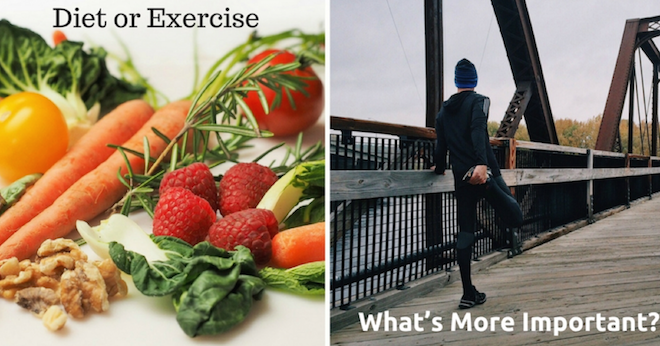
What’s More Important: Diet or How Much You Exercise?
What’s More Important: Diet or How Much You Exercise?
Eat to live, not live to eat. This proverb, attributed to Socrates, has never resonated with more people than today. According to WHO, the world is facing an escalating pandemic of overweight and obesity, which, in turn, leads to the increased risk of heart disease, diabetes, and even cancer. Although many people want to lose weight mainly for aesthetic purposes, these alarming facts are the reasons why embracing a healthier lifestyle should be at the top of everybody’s agenda. Establishing whether diet or exercise is more important for weight loss has long been a chicken and egg situation, but new scientific findings solved this mystery.
What’s Your Goal?
Both exercise and diet are important for your well-being, but if you want to know which one to push harder, you need to determine what your goal is. Let’s crunch some numbers, first. If you want to lose just one pound, you need to burn 3,500 calories more than you eat a week. As you can see, the maths is pretty simple, but achieving that milestone can be tricky. If we bear in mind how difficult it is to burn 500 calories, and how easy it is to dig in and eat them when you get home from the gym, it’s clear that a certain balance has to be established. No matter how much you exercise, you can always eat more than you can burn. So, depending on what you want to achieve there are different eating and exercise plans that you should follow.
- For weight loss, eating fewer calories is a must. Exercise is important, especially because whenever you drop a few pounds you don’t lose only fat tissue, but also your muscle mass and bone density. Base your diet on fruits, vegetables, nuts, and healthy fats, and cut down on processed foods. Physical activity together with snacking on protein-rich foods will help you stay fit and healthy, as well as prevent osteoporosis.
- For reducing the risk of heart disease, the leading cause of death women in the U.S., physical activity should be your first choice. Cardio exercise, such as running or riding a bike, for at least 150 minutes a week is essential for keeping you fit. Apart from that, try to spend less time sitting, and stick to a balanced, healthy diet.
- For boosting energy levels, you should focus on your diet and try to keep your sugar levels steady, because sugar swings can seriously affect your mood and energy. Instead of having 3 big meals a day, you should opt for 6 smaller ones. Between those main meals, two healthy snacks consisting of a banana, peanut butter and crackers, or low-fat yogurt with granola, are recommended. That way, you’ll maintain your sugar and cortisol levels, and avoid mood swings, depression, and anxiety. Of course, physical activity would be a welcome addition to this healthy lifestyle.
The 80/20 Rule
It’s hard to be strict with your diet and eat only healthy foods. That’s the reason why many people experience that unpleasant yo-yo effect of dieting, as they tend to regain their weight as soon as they return to their usual way of eating. In order to prevent this unhealthy habit, a complete dietary and lifestyle change is necessary.
The 80/20 principle is great. It basically, means that you should eat healthy and nutrient-rich food 80% of the time, and you’ll still have the 20% to make an occasional slip-up. In other words, if your diet is predominantly healthy, it won’t be a disaster if you enjoy your favorite chocolate cake, a glass of wine with some cheese, or a pint of beer once in a while. Since it’s important to provide your body with all the nutrients it needs, check out a well-stocked discount chemist where you can find a wide range of vitamins, supplements, and everything else required for a healthy lifestyle. Another take on the 80/20 rule says that 80% of your fitness endeavors should be focused on your diet, while the remaining 20% should be dedicated to exercise. This ratio is the golden rule that many fitness enthusiasts swear by.
To put it in a nutshell, both diet and exercise are important if you want to be fit. However, the factors such as a good night’s sleep, an active lifestyle, and avoiding stress are equally important for your overall well-being.















